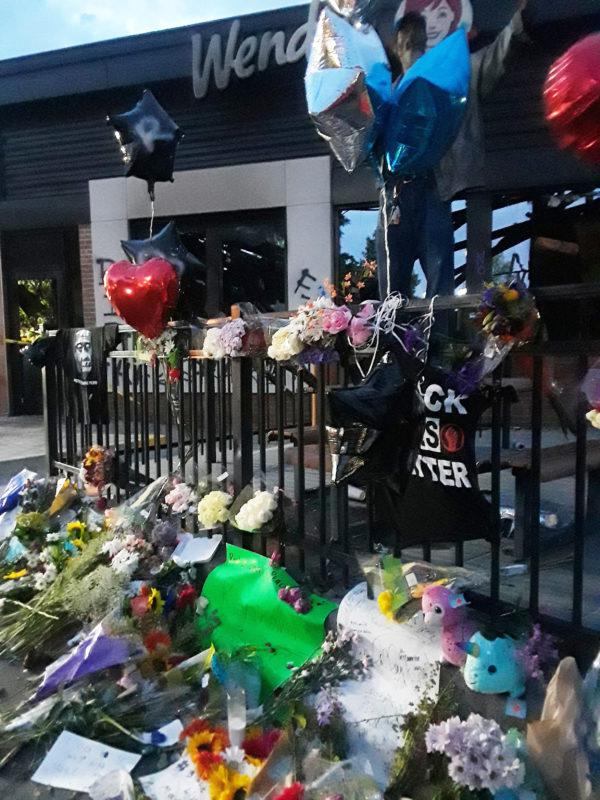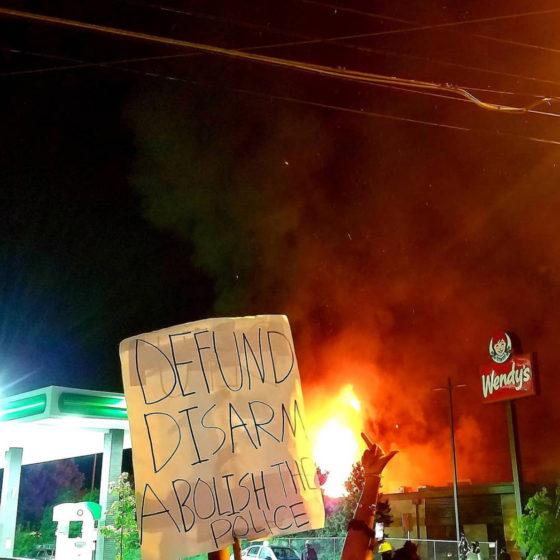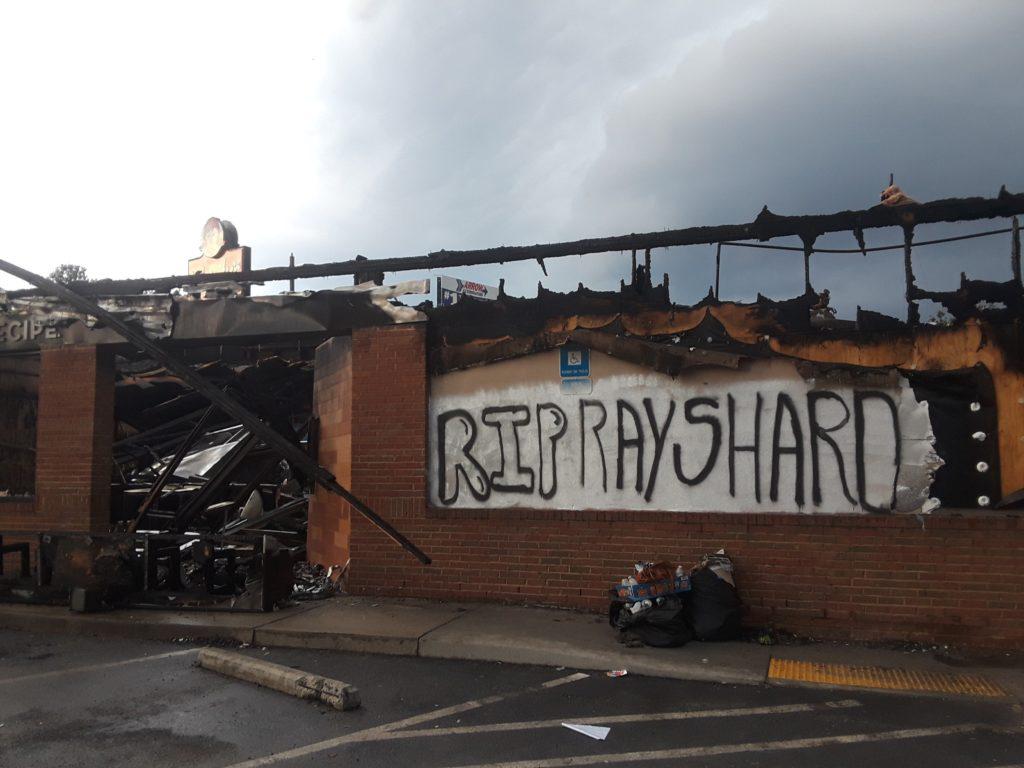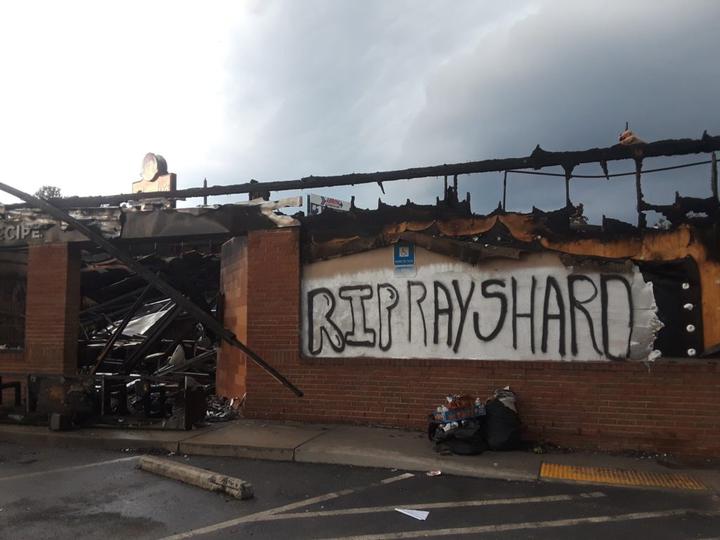2020-06-25
Defund the Police And…
by Dylan J
My partner and I are awakened at 7 am on Friday morning by an
emergency phone call. A family member is suicidal after a week of
suffering paranoid delusions. This is one of a few crises in the last
few years.
After we make a plan for support, I check my phone. A police
precinct in Minneapolis was torched the night before in outrage over the
murder of George Floyd and over 1000 murders of Black people at the
hands of the police per year.
That day, I attend the first of many protests, inspired by the
property destruction in Minneapolis, for George Floyd, Breonna Tayler
and Ahmaud Arbery in Atlanta, while my partner visits the family member,
and tries to convince him to voluntarily check into a hospital for an
evaluation. He’s not convinced.
My partner and I get very little sleep that weekend, staying out
late at protests, and staying up later glued to the news. The National
Guard occupies downtown Atlanta throughout the weekend, working with
multiple police departments to attack and arrest protesters. In
response, cop cars are torched, businesses are looted, statues are
destroyed. I text my friends in other cities, “Are you home safe?”. We
brainstorm ways to support the ongoing rebellion. We research support
options for the family. I have dreams of a police free world. I have
dreams of a world with free healthcare for all. I have nightmares about
tear gas. I have nightmares about death.
Our family member also gets little sleep that weekend, convinced an organized group is conspiring to murder him.
Early Monday morning, he attempts suicide.
After less than 24 hours at the hospital, he’s transferred to the
only residential facility with a bed available, two hours from any
family. He tells us the conditions inside are worse than any jail. When
the weekend comes, we discover we can’t get through to anyone at the
facility. When they determine he’s “stable” enough to be released, we
beg for information about a long-term support plan to discover that
there is none. We finally set follow up appointments for him for a week
following his return home. We have no idea where the money will come
from.
Initially, the ongoing protests against police brutality and my
family member’s mental health crisis feel worlds apart. But after a week
of being placed on hold, transferred, questioned “He doesn’t have
health insurance?”– after a week of looking into every single option for
ongoing support in the metro Atlanta area and being told by trusted
friends, “Honestly, that place is like a prison”– I’m reminded yet again
that the health care system in America is not unrelated to the systems
of incarceration and policing.
We brace ourselves for what’s sure to be a long journey. When we
realize that nobody is coming to save us, I try to encourage the
family. “We will become experts,” I say. “There is another side of
this.” “Many people have been through this before.”
But I wake up every morning before the sun– terrified.

<figcaption>
The site of commemoration for outside Wendy’s in Atlanta, where Rayshard Brooks was killed by the police
Defund the Police?
</figcaption><figcaption>
Two weeks into the national uprising, calls to defund the police havebegun to circulate online, in the mainstream media, and in the halls ofpower. This is not surprising: movements in the US almost always end up culminating in demands of some sort. Just as we did during the push for “cameras on cops” in the movement for Black lives, with defunding wemust ask ourselves, “Will the situation be favorable or easily used against us? Does this reform create more power for ourselves and dismantle the power of the state?”
On the surface, slashing budgets for police sounds like a useful stepon the path towards abolition. But we must dig deeper, because city andstate governments are rapidly moving to placate us around this demand. Minneapolis City Council recently announced plans to defund and dismantle the police and cities like New York City and Portland are moving to cut police department budgets. We must make sure that if defunding is achieved, we will in fact be stronger.
The argument is common sense: Stop funding police, who only harm us, and redirect those funds to social services in order to address the underlying social ills in our society. Sounds good to anyone with a conscience.
But there are a few inherent assumptions behind the calls to defund police: (1) There is only so much money to go around, so we must redirect that money to social welfare. (2) If social services receive more money, then these services will benefit more people (3) Defund is astep towards disempower, disarm and disband.
Let’s break these down a little.
When we place demands on the state budget, calling for reallocation of funds from the cops, military, or elsewhere, we accept the neoliberalargument of limited resources in a limited world. Yes, it’s true that
there are natural limits to natural resources. But we cannot accept capital as a natural resource– it is socially created. When we push to defund police, we buy into this concept of redistribution of wealth thataccidentally embraces the existing organization of society. We risk turning into co-managers of capitalism, and creating movements whose highest aspiration is to correct the ruling class– they’ll continue to rule, but more humanely. Decades of neoliberal austerity have left us fighting for scraps over state funding, like the mid-century housewife who must constantly negotiate with her husband over his wages in order to ensure there’s enough money to feed her children.
In reality, however, the state budget limitations are largely fictional. This is proven year after year as the US government continuesto rack up massive deficits to pay for so-called “defense”,while continuing to allow huge tax cuts to corporations. Instead of accepting the arbitrary limitations placed on the budget by politicians,we must reject the entire charade.
And speaking of the money, the US healthcare system is the most expensive healthcare systemin the world. When you combine the money spent on social security, medicaid, medicare, and healthcare, a picture comes into focus: No amount of money can solve the social problems in our society. Shifting funding to healthcare will not solve the larger systemic issues of a broken health insurance system, high costs of appointments and medication, access to doctors and treatment, unemployment, houselessness, and disparities in quality and access along racial lines.
And shifting funding to further social services will not address the carceral logic of these systems which require us to submit to surveillance and control, as is the case with Temporary Assistance for Needy Families, Social Security Disability Insurance and unemployment benefits.
If we uncritically embrace the cry to defund police, we fall into thetrap of social democracy: tear down one state entity just to build up others. But the state itself works to maintain the conditions necessary for the accumulation of capital.And in the midst of ongoing economic crises, climate catastrophes, and international uprisings, capital accumulation will undoubtedly require more coercion, surveillance and control.
Defunding the police does not guarantee disarming or disempowering police. What will happen to the grenade launchers, sniper rifles, submachine guns, and flashbang grenades currently available to police?
And what about the National Guard, the US military, the private securityforces and the militia who have been called in for protest control? What new private security forces might emerge? Will these police forces just reemerge under a new name?And what about the courts and the prisons? Is it possible that social
service programs could step in to fill the place of police by forcing usto submit to further invasive measures to receive support? Without abolition of the whole system of incarceration, surveillance and control, the beast will find a way to rise again.
On top of this, calls to defund the police are easily watered-down and even stripped of all abolitionist content.We set the movement up for co-optation by liberal careerists, cooperation with local politicians, and placation through petty reforms.
</figcaption><figcaption>
Reveal the Limits…

@aworldwithoutpolice on Instagram
Over the last few years, organizers in the US, including in my own group, Unity and Struggle, have experimented in “non-reformist reforms”,essentially reforms to demand and organize around which seek to limit the power of the state and capital. This isn’t anything new; it’s just our generation’s attempt to figure out how to organize in the immediate moment to build power, while keeping sights on revolution, and trying toavoid settling for activist ambulance chasing.
Assuming organizing around campaigns that put demands on the state is a worthwhile path,we can still recognize its pitfalls and admit that this must be only one part of our work. We have to shift our thinking away from putting demands on those in power and towards taking power ourselves.
This is a tricky balance. We need to stay firmly rooted in the class through organizing (which often takes the form of organizing to push demands), while also resisting the temptation to get wrapped up in unending reform work. In times when the class struggle is relatively low, we work to create continuity between waves of movement, retain organic working class militants through organizing work, and in the process, skill-up for the waves to come.
But what if this moment is different? Black people all over the country,disproportionately affected by the pandemic, police brutality and unemployment, decided that the horrors of everyday life outstripped the risk of dying from a horrifying pandemic. And hundreds of thousands of non-Black people joined them in the streets. After decades of a “raceblind” America, after many cycles of Black struggle, massive numbers of white and other non-Black Americans have finally begun to open their eyes to the reality of white supremacy and anti-Black racism in this country. Property destruction has received widespread support within themovement, even if now we’re seeing a takeover by dangerous peace policeand other defenders of the status quo.
Among the most militant layers of the movement, we’ve seen moves to redistribute looted property, take over a hotel and establish other autonomous zones, decommission police cars and precincts, and remove confederate or other racist statues. In other words, we’ve begun to see people take matters into their own hands.
For those of us under 50, this is entirely new. The movement has never gone this far in our lifetimes, and our tasks at first seemed unclear. Throw up demands before the reformists do? Try to move the protests out to the suburbs? Confront peace police before they kill the militancy of the movement? Try to build organizations out of relationships we’re making in the streets?
One thing is clear, however: We must help the movement reach and transcend its absolute limits, nothing less.
One role of demands is toreveal those limits. The demand to disarm the police immediately hits a wall: the state will never disarm its police force whose role is to control a heavily armed populace. Demands to abolish or disband police forces beg the question of the real role of the police in society. And these demands allow the movement to continue forward, instead of giving the state an opportunity to pacify the movement by reallocating a million dollars, while leaving the institution fundamentally intact.
…And Take Control
As of last week, it seems that “Defund the Police” has gained popularity within the movement. A much-needed response to the reformist (and useless) 8Can’tWait, 8toAbolition has emerged to push a non-reformist reform path to abolition, and activists all over the country are beginning or continuing campaigns to kick police out of their unions, their schools, and their city budgets. So yes, let’s defund the police, and let’s continue to organize in ways which move us closer to direct democratic control. Here are a few thingspeople are already doing:
1: Build conflict resolution and crisis management circles. Make ourselves experts. In the process, transform how we think about crime and punishment, conflict and resolution, autonomy and crisis. In Dekalb County, Georgia, a group called Us Protecting Usis currently working to build a personal crisis support workshop, in which people learn how to support each other during mental health crises without involving police or outside agents.
2: Organize medical professionals to provide free healthcare.
3: Coordinate mutual aid projects to meet our basic needs. There has been a proliferation of mutual aid projects during the pandemic, and long-standing groups like Mutual Aid Disaster Relief works to provide mutual aid during and after natural disasters. Connect mutual aid to fighting strategies, to not just provide for our needs, but to directly confront and challenge state power.
4:Take over abandoned buildings to house people without homes or those trying to escape abusive situations. A product of years of organizing, groups like Oakland’s Moms 4 Housing show the way forward. In Minneapolis, years of organizing led to a hotel takeover in the midst of the George Floyd protests.
5: Organize radical childcare collectives to break the isolation of the family.
6: Create and defend “no cop zones.”
7: Disrupt street patrols by cops, expanding on projects like Copwatch to move from recording to intervening.
Disrupt community policing initiatives and police recruitment events to deny departments the ability to
re-establish local legitimacy.
8: Take a cue from statue removal crews: coordinate with crews we’re meeting in the streets to disrupt
surveillance technology or other police infrastructure.
9: Demand that police precincts are altogether closed (immediately) and if they aren’t, close them down ourselves.
10: Prepare to continue our work on the frontlines.

In response to the Atlanta police killing of Rayshard Brookson on June 12th, the sight of his murder was burned to the ground.
We Cannot Afford to Wait
More than two weeks have passed since the first night of George Floyd protests in Atlanta. After an initial weekend of militant resistance, protests turned passive and tiring as non-profits leaders swooped in to redirect energy towards reforms and celebrities stood withthe progressive mayor to condemn expressions of rage.
But the institution of policing is inherently violent, and no amount of reform will eradicate this violence.
On Friday, June 12th, a police officer murdered Rayshard Brooks, father of 3, in plain sight of witnesses, without shame.
In response, the sight of his murder was burned to the ground.
I am reminded of Joetavius Stafford, Oscar Cain, Alexia Christian, DeAundre Phillips, Anthony Hill. That more than half of people killed by police are living with a disability. I think of my own family member, living with a disability, who is faced with dual threats:the lack of resources and the threat of police violence.
Within the movement, two camps have formed. The first camp desires serious reform of the police. They hope they will win without further violence. They believe that the state can be negotiated with, reformed, perhaps even controlled. They call for “peaceful” protest and threaten to snitch on anyone acting beyond their limited framework of resistance. They push for defunding police, and they even go so far as to do the job of the state by drafting policy for city councils.
The second camp is not easily satisfied. They recognize and articulate that capital is the enemy, even if that articulation is non-verbal. They have no faith in the state; they do not negotiate. Theyare rehearsing for the future, learning to control their own destinies.
They cannot afford to wait for the state to reform itself.
And as I continue to lean on friends and comrades, seeking out community resources for my family to get the support and skills we need,I am reminded that we, too, cannot afford to wait.
</figcaption>
<figcaption></figcaption>
Unity and Struggle
Länk: http://www.unityandstruggle.org/2020/06/defund-the-police-and/




